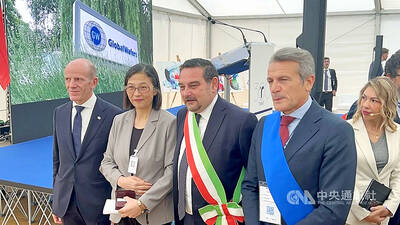Amazon.com Inc has extended the operations of its Amazon Web Services (AWS) in the Asia-Pacific region by expanding the services’ “Regions” coverage to Taiwan, the company announced yesterday.
As part of that commitment, Amazon could invest US$5 billion in Taiwan to support the construction, connection, operations and maintenance of data centers, the company said.
AWS Infrastructure Services vice president Prasad Kalyanaraman in a statement said that the Regions expansion to Taiwan would enable start-ups, developers and non-governmental organizations to use AWS’ on-demand information technology Web services.

Photo: AP
Those services include cloud computing storage, databases and even more advanced analytic utilities, as well as artificial intelligence.
Active customers in Taiwan include 104 Corp (104人力銀行), Acer Inc (宏碁), Cathay Financial Holding Co (國泰金控), Chunghwa Telecom Co (中華電信), Taiwan Semiconductor Manufacturing Co (台積電) and many others, Amazon said.
Kalyanaraman said that organizations in Taiwan and other Asia-Pacific locations could join millions of clients in enjoying the speed of the services that is integral to increasing the pace of innovation, quality of operations and cultivation of sales for end users.
THAILAND ADDED
The worldwide network of AWS Regions includes 117 availability zones spanning 37 geographic locations.
Taiwan and Thailand have become the latest Regions additions to AWS services in the Asia-Pacific region, joining the likes of Tokyo, Osaka, Seoul, Malaysia, Singapore, Jakarta, Hong Kong and Beijing.
AWS Regions are made up of various availability zones that use infrastructure independent from one another, each working with its own power, cooling system and security protocols.
Taiwan’s three availability zones, for example, are far enough apart to provide a network to a large number of clients and are also close enough to operate in tandem at high efficiency and limited delays.
INTERNATIONAL SCALE
In Taipei, Premier Cho Jung-tai (卓榮泰) thanked Amazon in a statement and said that the extension of the services to Taiwan demonstrated the nation’s importance as an integral member of the global supply chain.
He said he looked forward to seeing Taiwan’s information technology capabilities integrate with AWS to advance the world’s digital ecosystem and contribute to the progress of technological development at an international scale.

RECYCLE: Taiwan would aid manufacturers in refining rare earths from discarded appliances, which would fit the nation’s circular economy goals, minister Kung said Taiwan would work with the US and Japan on a proposed cooperation initiative in response to Beijing’s newly announced rare earth export curbs, Minister of Economic Affairs Kung Ming-hsin (龔明鑫) said yesterday. China last week announced new restrictions requiring companies to obtain export licenses if their products contain more than 0.1 percent of Chinese-origin rare earths by value. US Secretary of the Treasury Scott Bessent on Wednesday responded by saying that Beijing was “unreliable” in its rare earths exports, adding that the US would “neither be commanded, nor controlled” by China, several media outlets reported. Japanese Minister of Finance Katsunobu Kato yesterday also

‘DRAMATIC AND POSITIVE’: AI growth would be better than it previously forecast and would stay robust even if the Chinese market became inaccessible for customers, it said Taiwan Semiconductor Manufacturing Co (TSMC, 台積電) yesterday raised its full-year revenue growth outlook after posting record profit for last quarter, despite growing market concern about an artificial intelligence (AI) bubble. The company said it expects revenue to expand about 35 percent year-on-year, driven mainly by faster-than-expected demand for leading-edge chips for AI applications. The world’s biggest contract chipmaker in July projected that revenue this year would expand about 30 percent in US dollar terms. The company also slightly hiked its capital expenditure for this year to US$40 billion to US$42 billion, compared with US$38 billion to US$42 billion it set previously. “AI demand actually

Jensen Huang (黃仁勳), founder and CEO of US-based artificial intelligence chip designer Nvidia Corp and Taiwan Semiconductor Manufacturing Co (TSMC, 台積電) on Friday celebrated the first Nvidia Blackwell wafer produced on US soil. Huang visited TSMC’s advanced wafer fab in the US state of Arizona and joined the Taiwanese chipmaker’s executives to witness the efforts to “build the infrastructure that powers the world’s AI factories, right here in America,” Nvidia said in a statement. At the event, Huang joined Y.L. Wang (王英郎), vice president of operations at TSMC, in signing their names on the Blackwell wafer to

Taiwan-based GlobalWafers Co., the world’s third largest silicon wafer supplier, on Wednesday opened a 12-inch silicon wafer plant in Novara, northern Italy - the country’s most advanced silicon wafer facility to date. The new plant, coded “Fab300,” was launched by GlobalWafers’ Italian subsidiary MEMC Electronics Materials S.p.A at a ceremony attended by Taiwan’s representative to Italy Vincent Tsai (蔡允中), MEMC President Marco Sciamanna and Novara Mayor Alessandro Canelli. GlobalWafers Chairwoman Doris Hsu (徐秀蘭) said the investment marked a milestone in the company’s expansion in Europe, adding that the Novara plant will be powered entirely by renewable energy - a reflection of its